Women in the Gaming Industry
Nine Questions for Scientist and Gamer Natalie Denk
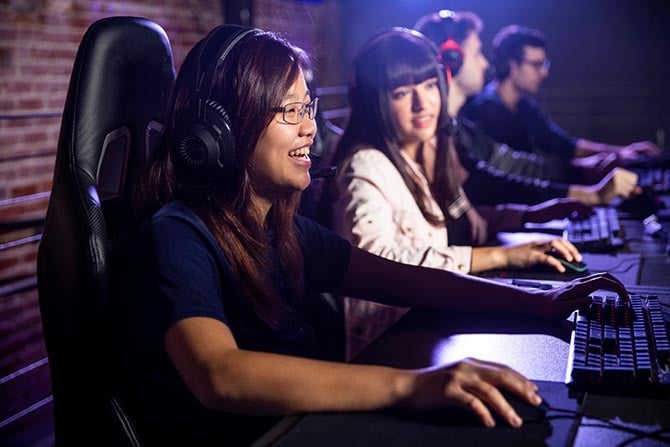
While half of all gamers are female, only few women are part of the professional esports scene. We have asked Natalie Denk, co-founder of the "League of Girls", why women are so underrepresented and what needs to change so that women can play a larger part of the industry.
Almost half of all gamers in Germany are women: Out of 34.3 million people who play video games at least casually, 47% are women. This is according to the annual report of the german gaming industry for 2018. This makes it even more surprising that there are so few recognisable female esports athletes in Germany. In this intervew, Natalie Denk, scientist and gamer, will explain why this is.
Women in esports: 9 Questions to Natalie Denk

Natalie Denk is a research associate at the Center for Applied Game Research of the Donau University Krems and a passionate gamer. In addition to numerous projects she is a part of the „League of Girls“, an initiative by PICAPIPE, a Viennese company, and is committed to increasing the visibility of women in esports. She tells us more about her work and how more women can be motivated for esports.
1. owayo: Mrs. Denk, what are you researching right now?
Natalie Denk: My focus is on Game Based Learning, Educational Game Design as well as gender aspects in relation to digital games. Currently I am mainly involved in the research projects CDG4E - Create Digital Games for Education (Erasmus+), Walk Your City (FFG) and Digital, healthy ageing! (FGÖ). In the CDG4E project, for example, a Game Creator is being developed in cooperation with partner organisations from Malta, Germany and Luxembourg, which can be used to create games for teaching content from all subjects. The content of the games can be created or defined by teachers or students themselves. The games developed with this can then be used on the go and shared publicly.
It is important to us that the topics of gender & diversity are taken into account in our research projects at all levels. This applies not only to the design of content (e.g. the design of game characters), but also to data collection, dealing with the target group or the conception of offerings.
2. You yourself are a passionate gamer. What do you like about esports?
First of all I find computer games as a medium fascinating in themselves and also the culture that has developed around gaming and is constantly evolving. The broad spectrum of video games as far as possibilities, experiences and approaches are concerned also needs to be pointed out here. In order to master a game, different skills and competencies are required, which players can aquire and improve during the game, but that they also bring to the game themselves.
And in the case of esports games or playing in a league, skills such as team spirit, self-discipline and organisational talent are also required. I am fascinated by what people are able to accomplish in eSports. At the same time, I am equally fascinated by what esports has already become in this country.
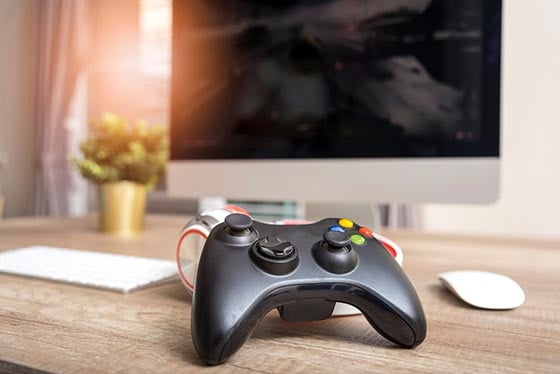
3. Why are women underrepresented in esports?
There are several problems that women* in the professional gaming industry have to face:
Missing role models: Esports tournaments are generally open to women* and men*. However, the esports scene is very male-dominated. This applies to players*, but also to all other areas, such as management or members of eSports associations. Women* therefore often do not see a career in esport as an option in itself. There is a lack of role models with whom women* can identify.
Fear of sexism: Of course, the entire gaming scene is not toxic to women*. But: So far I haven't met a female esports athlete who hasn't reported sexist incidents. Women* must also fear that they will not be judged according to their performance, but according to their gender. If a woman* does badly in a game, it quickly means she plays badly because she is a woman. Of course, all this has something to do with gender-specific socialization and the transmission of stereotypical role patterns.
Gender-specific socialisation: From birth, we are faced with certain socially constructed gender roles. "Video games" are seen as an activity with a more male connotation. This leads, for example, to the fact that it is often not even assumed at first that girls* are interested in computer games or could develop them. In this way, stereotypical role models become entrenched. Statistics show, however, that women* and girls* enjoy playing computer games regularly. Nearly 50% of those who claim to play computer games at least occasionally are female*. A completely different picture emerges when you look at the professional gaming scene (eSports, LAN parties, game development). Women* are massively underrepresented here.
Non-perception of women* as a target group of the gaming industry: The stereotype of women* and girls* who are not interested in video games also means that the gaming industry still does not widely perceive women* as a target group. This can be seen, for example, in the design of game content, where it often becomes clear that this is intended to appeal to heterosexual young men*. This says a lot about how the gaming industry thinks and in turn suggests that video games are not for women*.
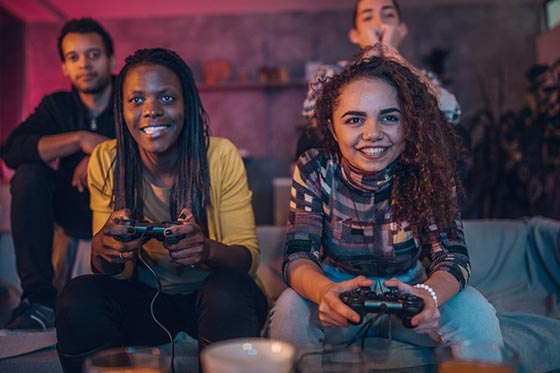
4. How can we change this underrepresentation?
We can and must make some changes to motivate women* to participate more in the eSports scene:
Role Models: Many women* do not perceive esports as a possibility for themselves. The most important train of thought to get involved in any activity is: "That could be me!" Making women* visible in esports as role models is one way to create this train of thought. Role models show that a certain goal can be achieved and make something new desirable for us.
Association work: A look at the list of esports associations and clubs also shows that hardly any women* are represented here. In order to make esports more attractive for women*, more women* should be involved in the associations - even beyond gender-specific working groups. This will also help to break down the image of a purely male-dominated esports scene. In addition, it is of course also necessary to explicitly address the topic of gender & esports.
Club work: Of course, clubs can do a lot as well. Here it is important to explicitly address women* and welcome them - for example, when it comes to setting up new players*. But women* also need competent contacts* when it comes to sexist incidents and the know-how to deal with them.
Gender competence in journalism: To make esports more attractive for women*, it is also necessary to develop gender competence in journalism. Women* should be perceived as potential readers of reports on esports. A suitable language or a targeted selection of photos or examples will help. Most articles that report on women* in esports are written to address the gender issue in esports (which is also important) - but it does not always have to be said that women* are active in esports.
Breaking down stereotypes as an educational task: My long-term goals are to promote a reflexive approach to stereotypical gender roles and to raise awareness at all levels. In order to achieve this, the confrontation with gender stereotypical role models must be understood as an educational task. Video games have become an integral part of the lives of children, young people and adults and are one of the most important entertainment media. For this reason, they must also become an integral part of our educational system - especially in schools. This also implies that gender competence is built up among educators* and parents.
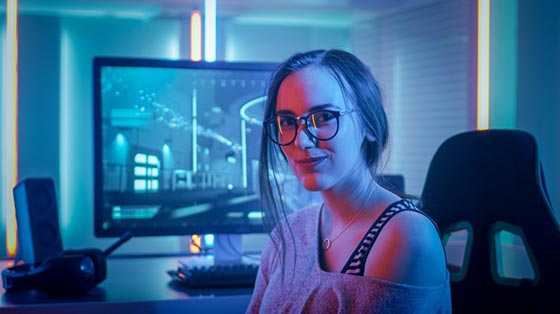
5. Are there typical men's and women's games? I would like to answer this question with a simple "no". There are studies that show differences in game and genre preferences between women* and men*. BUT: Of course we always have to take a closer look here and also ask the question where these differences are coming from (keyword: gender-specific socialisation.) In addition, I think it is counterproductive to talk about men's and women's games at all, because this again fuels and constructs gender role clichés. Instead of dividing games into women's and men's games, the games industry should be aware of the diversity of gamers. Instead of developing games specifically for women*, games should be gender-inclusive. This means, for example, abandoning eternally "ruminated" gender role clichés and stereotypes and instead drawing interesting - and not arbitrarily interchangeable - characters. I'd say here that you don't just do good for women*, but for all gamers*.
6. Do women in esports have different strengths and weaknesses than men? No. There are no serious studies that would prove that there is a difference in gaming behaviour or performance between women* and men*. The nice thing about esports is that - in contrast to many conventional sports, such as football - gender segregation is not necessary for physical reasons. Nevertheless, this is unfortunately still often suggested and attempts are made to force gender-specific differences.
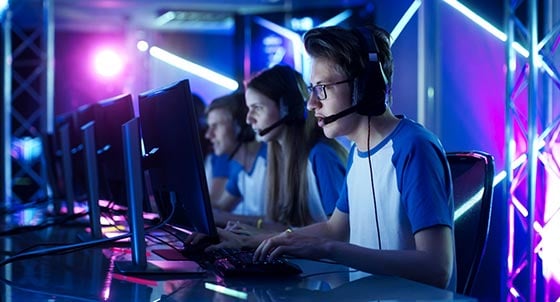
7. Is there any support and opportunities for exchange for women in esports?
Association work: Last summer, the ESVÖ - the Austrian eSports Association - elected Yvonne Scheer as the official gender commissioner. For the ESVÖ Yvonne supports the promotion of women in esports and is therefore also the contact person for women* who want to get involved in esports. In my opinion, this is a very important and necessary function to remove barriers to entry. In Germany the ESBD has recently formed a working group which is dedicated to increasing the quota of women in esports.
Platforms: One of the best known platforms for promoting diversity in e-sports is AnyKey - an initiative of ESL and Intel. This platform also lists further Communities dedicated to the topic. Our initiative "League of Girls" is also committed to the promotion of women in esports and promotes networking within the esports scene.
Social media networks: Various groups in social media networks (Facebook, Twitter, Discord) are a good place to go. This is where the most diverse online communities are formed, where you can exchange information specific to a particular game or just in general.
eSports events: Of course it is also recommended to visit esports events, meet-ups or conferences. The next eSports summit in Vienna will take place on September 6th 2019.
8 What is your opinion on all female teams?
So far I have met female esports athletes who reject Female-Only leagues as well as those who feel very comfortable in Female-Only leagues. I can see both sides of the argument. It seems to me that esports clubs are increasingly beginning to focus on this topic and are setting up female-only teams. Of course this is to be welcomed. But in my opinion the efforts could also be used to build a gender-mixed team.
Female-Only tournaments can serve to address the under-representation of women* in esports and to provide women with a space in which they can move without automatically comparing themselves to the opposite sex and consciously or unconsciously subjecting themselves to certain role patterns. However, it becomes problematic when one believes that one has solved the "gender problem" in eSports with female-only leagues.
In my opinion, the long-term goal should be that women* and men* play together and gender simply doesn't play a role here - unlike in many conventional sports, where there is a physiological limitation or difference based on gender, it doesn't in fact in eSports.
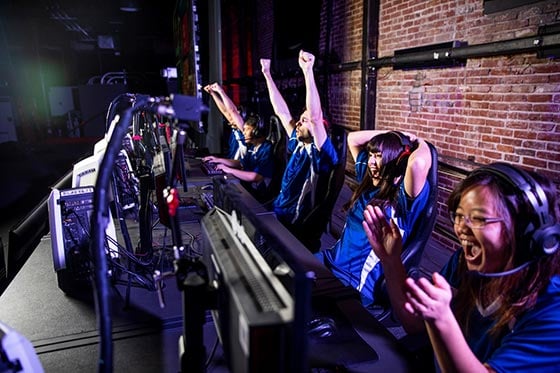
9. How did the "League of Girls" come into being and what are the goals behind it?
"League of Girls" (LoG) is a project of PICAPIPE, where I work in addition to my job at the Donau-Uni. LoG is a platform and initiative that promotes women* and girls* in the gaming scene - especially in esports and streaming. On the one hand, our goal is to make female gamers visible and to draw attention to the necessary diversity in the scene and on the other hand to promote networking within the eSports scene.
Members can share posts that deal with gender, diversity, esports and gaming. We also feature twitch channels by female streamers to establish female role models in the scene. By the way, anyone who wants to set an example for more diversity in the gaming scene can register - men* are also welcome, of course.
As part of our "League of Girls" initiative, we are also trying to find ways to bring the topic of gender & eSports into the educational arena and to promote girls* in particular. At the moment we are doing this with our eSports school league Floridsdorf, the 1st eSports school league in Austria and before that with our LoG-school event. We hope to find ways in the future to combine esports and school in a meaningful way.
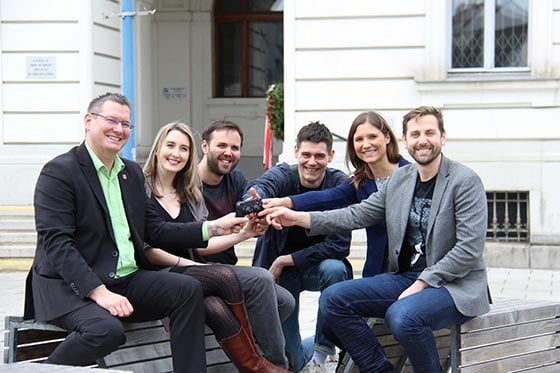
We want to thank Natalie Denk for answering our questions!
Women in esports - A summary of the interview
Here we have a summary of Natalie Denk's most important points for you:
- The reasons for the under-representation of women in esports are:
- Missing role models
- Fear of sexism
- Gender-specific socialization
- Non-perception of women as a target group of the gaming industry
- Natalie Denk sees potential change through:
- Creation of role models
- Adjusted work of associations and clubs
- Increased gender competence in journalism
- Breaking down stereotypes as an educational task
- There are no typical male and female games or differences in the style of play between women and men. However, the gaming industry should produce more games without stereotypes and be aware of the diversity of gamers*.
- Women can network and interact in online communities and platforms like "League of Girls" and "AnyKey".
- Female-Only-Leagues can help to draw attention to the issue and give women space, but must not be seen as the only solution for involving women in esports.
Together as one!
Whether you are part of a female only team, an all men's team or a mixed team - a visually uniform appearance at an esports tournament shows your team spirit. You will find numerous designs in our online shop and be able to create the perfect design for your team in our 3D Kit Designer.
In our article "esports - gaming for money" you can read how to become a professional esports player and earn money with it. To make sure your professional gaming career is successful, we have taken a look at proper esports nutrition in our article „eSports training: nutrition and fitness“.
Have fun training!
Photo credits: Title picture: © gettyimages/adamkaz, Picture 1: © Natalie Denk, Picture 2: © gettyimages/virojt, Picture 3: © gettyimages/outh_agency, Picture 4: © gettyimages/gorodenkoff, Picture 5: © gettyimages/gorodenkoff, Picture 6: © gettyimages/adamkaz, Picture 7: © Bezirksvorstehung Floridsdorf